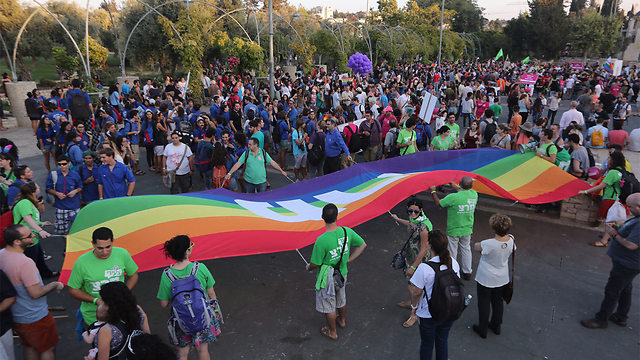An Israeli interoffice committee determined that the Palestinian Authority does not persecute homosexuals in an institutional manner, and therefore Israel is not obligated to grant asylum to Palestinians of the LGBT community.
Palestinians from the West Bank have made various requests for asylum to Israeli authorities and petitioned the Israeli courts, claiming there was a threat to their lives because of their sexual orientation, or because of family honor, among other reasons. This led to the creation of the committee meant to discuss the need for a mechanism to examine Palestinian claims for asylum on these grounds.
The committee, which included members from the Justice, Foreign, and Interior Ministries and the Prime Minister's Office, said "there is no systematic persecution based on sexual orientation in the Palestinian Authority," and that at least in some cases, the requests for asylum for this reason were motivated by the desire to live in Israel's more liberal lifestyle, and not because of an existing threat to their well-being.
The committee also stated that many who requested asylum had a criminal background, or spouses in Israel, and it was possible that these factors were behind the requests.
However, they noted that they couldn't rule out the possibility that in specific cases there could be a real fear for the person's life, but in light of the treatment of homosexuals and lesbians by the PA and the Palestinian public, it would be inaccurate to consider "these rare instances as a persecuted group" and that every case should be examined within the current overall framework.
Committee members recommended that in extreme cases that were "few and far between," in which there was claim of a threat based on family honor and other circumstances, the claimants would be referred to those responsible for welfare in the Coordinator of Government Activities in the Territories Unit, and that there was no place for creating a separate entity to this end.
The report, which was based on the opinions of the IDF and the police, explained that sexual relations between people of the same sex over the age of 15 was not considered illegal in the PA, but that it was seen as taboo by religion and social norms there. The committee further stated that extroverted behavior could lead to PA police investigation, but most do not face legal proceedings.
Regarding claims of persecution over family honor, the report noted a paradigm shift that had begun in the PA, including in the legal system. But the changes have been extremely slow, and the matter has not received enough attention. However, the report found that claims on this basis were very rare, and that there were existing solutions, sometimes at monasteries in the PA, abroad and in Israel.
Among the eight petitions to the Supreme Court was one involving a minor who claimed he suffered severe physical abuse from his father, who disowned him, and that after his sexual orientation was discovered his family began searching for him to hurt him. When he realized he was in danger, he fled to Israel.
The various organizations petitioning in the names of Palestinians, including the the Refugee Rights Clinic (RRC) at Tel Aviv University's Faculty of Law, were expected to protest the report's findings, as the petitions claim severe persecution on the basis of sexual orientation in the PA, including kidnappings, torture, and murder attempts. They said the only protection provided by the PA was being placed in custody.
















